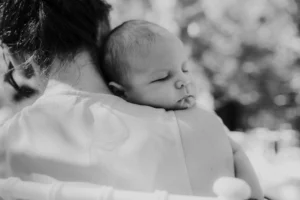The little snort here and there. The sweet little nose whistle. The consolation of the snore reassuring us they are getting great sleep. Infant snoring is so adorable, right? Wrong.
Unfortunately, they are not so adorable. You are not alone in this, I used to think so, too, and I am a professional sleep authoritarian.
You’re not the only mom who has a snoring, mouth breathing baby dragon, and while I can’t train your little baby to fly, I am going to share with you some of the tricks and tips to ensure your baby is breathing, and sleeping, safely for a sound sleep the whole night through.
Are The Noises my Baby Makes Normal?
When our babies are asleep, we are assured that they are getting the adequate rest their little bodies need, more often than not, we are not concerned with how they sound when they are sleeping, so long as they are sleeping. I personally find it reassuring to hear them, so I am not panicking that they have stopped. Anyone else stare at their babies like a creeper waiting to see their little chest rise and fall?
Unfortunately, the sweet little noises our babies are making, including the mouth breathing that may go along with it, are signs that something is not right, and needs to be corrected.
We have all heard so often that breathing correctly is relative to Yoga, meditation, or for die hard athletes. I remember my gym teacher reminding us to breath in through our noses and out through our mouths. If you are like me that technique doesn’t feel natural, and I am suddenly realizing I haven’t been breathing correctly for a long time now. And I suppose this is a gentle reminder I need to spend more time at the gym.
The good news is, we can of course correct our babies’ habits, so they do not create the same bad habits we have over the years.
Reasons Why Nose-Breathing is Better for Our Babies
● Breathing through your nose increases the amount of oxygen we get to our lungs
● We expel more carbon dioxide
● Lowers your heart rate
● Increases lymphatic flow
● Reduces stress on the heart
● Produces nitric oxide that expands blood vessels and increases blood flow
● The little hairs and mucus in the sinuses help to filter out impurities in the air
And we thought those little hairs were just something else we needed to wax. (Fun fact, if you do wax your nose, make sure your esthetician is only waxing the outer layer of your nostril.)
The habit of breathing through our mouths was created when we were babies, and unfortunately, our parents did not have the same information available to them as we do now. They only had ol Doc Johnson suggesting a nip of whiskey along their gums for almost any ailment. Teething? Whiskey. Snoring? Whiskey. Luckily, we’ve come a long way and now have a better understanding of how to make positive changes for our babies and toddlers.
Some of the negative factors of mouth breathing include:
● Affect facial growth
● Create issues with teeth, and cause gum disease
● Increase the risk of throat infections
● Stunt growth
● Create sleep issues and insomnia
The way we breathe has never really been a big topic amongst moms or mom groups, and it’s not a common concern addressed by your pediatrician, either. That is where I come in, your mouth breathing sensei! Breath in, breath out, and repeat.
Sleep cycles – what are they and am I in the right one? There are various sleep cycles we go through during the night. I swear, my husband can fall asleep in 3 seconds and it seems as though he is in a restful, deep sleep through the night while I am sleeping with one eye open and need 3 cups of coffee to get going in the morning. I digress.
As we sleep, we go from a light cycle to a deep/deeper sleep, and then into our dreaming stage, commonly known as REM. During the first stage of the sleep cycle, we are on high alert and can wake easily. This stage is hard to recover from, often taking time to get past into a restful sleep again.
Adults cycle through the stages in about 90-110 minutes per cycle, and for babies, they are closer to 45 minutes. This is why some babies are frequently awake often during the night. Us parents know far too well that cycle for our little ones and it always seems to happen right as we enter a deep sleep.
The sign on the door to not ring the doorbell is not there for fun. If someone wakes my sleeping baby, I can’t guarantee their safety and they better run, and really any speed will work for them
Ever slept next to a snorer? I have and let me tell you, I am a lover, not a fighter but there are times I have lain awake listening to my husband snore and I understand why some people feed their husbands to tigers. I’m not saying I agree, I just understand.
In the light stages of sleep babies are woken easily whether it be a dog barking, older siblings, us trying to get a quick load of laundry done so we have fresh bibs to wash again later, it is distracting to our little ones causing them to awaken abruptly and often crabby.
Read How to Transition From Quiet to Nap Time
How To Stop Infant Snoring
Sleep deficit in babies leads to many issues for our babies, and we need to be proactive to ensure their sleep cycles are completed fully, and with the correct breathing techniques.
How do we do this? Rest assured, there are some simple steps you can start with by simply using your cell phone or a recording device.
While your baby is sleeping, record their breathing while they are sleeping, and try to get a few couple minute recordings that you can bring to your pediatrician. While only one recording will suffice, having a couple will help their Doctor understand their patterns and if they are hearing anything alarming in them. If the Pediatrician is concerned, they may refer you to a respiratory specialist. Most often, you will need a referral and while it may seem like you’re saving a step, skipping your pediatrician and trying to find a specialist on your own may cause a longer delay in getting help.
The respiratory specialist will perform their own studies, and typically with better equipment than a cell phone. I would be a little suspicious, and probably change doctors quickly if they were only using a cell phone. “Smart” phones aren’t always that smart.
The specialist may find that removing the tonsils or adenoids are a favorable solution for your baby, and while it may sound scary, it is a very common procedure performed over a half million times a year.
They also may decide surgery is not needed and may recommend nasal strips, which are thin strips of metal encased in a cotton sheath with adhesive on the back where it will stick to the outside of your babies nose, while gently pulling open their nasal passageways. It may make for some funny pictures you can display at their graduation, though it does work well.
Keep in mind, snoring may be common for babies who are sick or congested, and this is more than likely a temporary issue, and not cause for concern. These types of snores usually dissipate as they start to feel better. Using a nasal bulb and saline solution to clear out clogged noses is a common route to take to help our babies breathe better while they are sick.
In this blog, I have laid out the main reasons and benefits that a solid, consolidated sleep cycle is important for our babies, and what happens when babies are deprived of it. If you want more in depth information or a refresher, the National Institute of Health has an extensive study you can read about here. And if you or your family are still struggling to figure out how to manage your child’s sleep, please don’t hesitate to book a 15-minute FREE consultation with me or one of my consultants! We’re not here to pressure you or sell you anything at all – we’re here to listen and come up with solutions so you can get back to the most important thing in your day – SLEEP!





